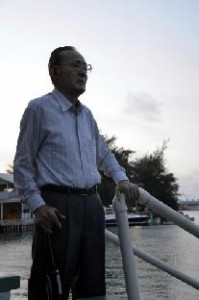Matashichi Oishi, exposed to fallout on Japanese fishing boat, visits Marshall Islands on anniversary of hydrogen bomb test
Mar. 6, 2014
by Jumpei Fujimura, Staff Writer
Majuro, Marshall Islands – March 1 marked the 60th year since a hydrogen bomb test was conducted by the United States at Bikini Atoll in the Marshall Islands, located in the Pacific Ocean. Matashichi Oishi, 80, a resident of Tokyo, was exposed to radioactive fallout from the bomb while serving as a crew member of a Japanese tuna fishing boat called the Daigo Fukuryu Maru (Lucky Dragon No. 5). Mr. Oishi said that his experience on March 1, 60 years ago in the Marshall Islands, changed his fate. As long as he lives, he said, he will continue to speak out about the horror of nuclear power. With thoughts of his late colleagues from the stricken boat, Mr. Oishi endured physical difficulties to make the trip to the islands, about 4,500 kilometers from Japan.
As he stood on a beach in Majuro, the capital of the Marshall Islands, Mr. Oishi gazed off to the northwest, where Bikini Atoll lies, and said, “I never guessed what was happening beyond the horizon. It was 6:45 a.m. on March 1, the time the hydrogen bomb test was performed by the United States 60 years ago.
The radioactive fallout, which reportedly accumulated as ash on the deck of the fishing boat, damaged the health of the 23 crew members. Among them, 16 have already passed away.
Mr. Oishi has undergone surgery for liver cancer, and suffers from diabetes and high blood pressure. Two years ago, bleeding in his brain left him walking with a cane. But, he said, “When I think of the anguish of the other crew members, who died before it was understood that their poor health was caused by radiation, I can’t help but continue speaking out.” Ignoring warnings from his doctors, he traveled to the Marshall Islands for the third time, and the first time in 10 years.
After arriving in the Marshall Islands on the night of February 26, Mr. Oishi began a busy pace, meeting with government officials, speaking at schools, and sitting down for interviews with the local media. On February 28, he met with a 65-year-old woman who was a resident of a contaminated island and was exposed to radioactive fallout. They shared haunting memories and their experiences of cruel discrimination. Feeling a kinship, they said they must hand down their accounts to younger generations.
The sea stretching out before him was calm, as it was 60 years ago when fate intervened. “If I hadn’t been exposed to the ash, I would have lived a peaceful life. I might be enjoying fishing now,” Mr. Oishi murmured, half-jokingly and half-seriously, as he watched some fishermen head out to sea.
(Originally published on March 2, 2014)
Majuro, Marshall Islands – March 1 marked the 60th year since a hydrogen bomb test was conducted by the United States at Bikini Atoll in the Marshall Islands, located in the Pacific Ocean. Matashichi Oishi, 80, a resident of Tokyo, was exposed to radioactive fallout from the bomb while serving as a crew member of a Japanese tuna fishing boat called the Daigo Fukuryu Maru (Lucky Dragon No. 5). Mr. Oishi said that his experience on March 1, 60 years ago in the Marshall Islands, changed his fate. As long as he lives, he said, he will continue to speak out about the horror of nuclear power. With thoughts of his late colleagues from the stricken boat, Mr. Oishi endured physical difficulties to make the trip to the islands, about 4,500 kilometers from Japan.
As he stood on a beach in Majuro, the capital of the Marshall Islands, Mr. Oishi gazed off to the northwest, where Bikini Atoll lies, and said, “I never guessed what was happening beyond the horizon. It was 6:45 a.m. on March 1, the time the hydrogen bomb test was performed by the United States 60 years ago.
The radioactive fallout, which reportedly accumulated as ash on the deck of the fishing boat, damaged the health of the 23 crew members. Among them, 16 have already passed away.
Mr. Oishi has undergone surgery for liver cancer, and suffers from diabetes and high blood pressure. Two years ago, bleeding in his brain left him walking with a cane. But, he said, “When I think of the anguish of the other crew members, who died before it was understood that their poor health was caused by radiation, I can’t help but continue speaking out.” Ignoring warnings from his doctors, he traveled to the Marshall Islands for the third time, and the first time in 10 years.
After arriving in the Marshall Islands on the night of February 26, Mr. Oishi began a busy pace, meeting with government officials, speaking at schools, and sitting down for interviews with the local media. On February 28, he met with a 65-year-old woman who was a resident of a contaminated island and was exposed to radioactive fallout. They shared haunting memories and their experiences of cruel discrimination. Feeling a kinship, they said they must hand down their accounts to younger generations.
The sea stretching out before him was calm, as it was 60 years ago when fate intervened. “If I hadn’t been exposed to the ash, I would have lived a peaceful life. I might be enjoying fishing now,” Mr. Oishi murmured, half-jokingly and half-seriously, as he watched some fishermen head out to sea.
(Originally published on March 2, 2014)








